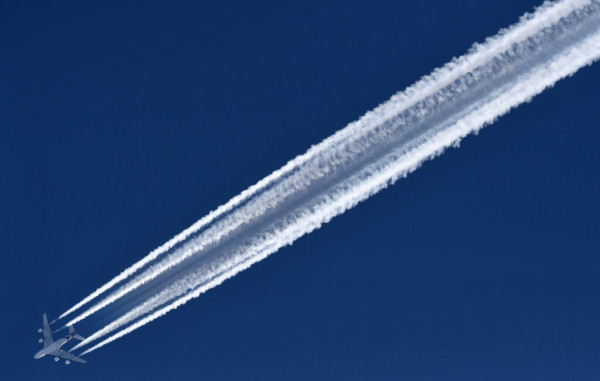Airlines clash in their election message to EU politicians
BRUSSELS — Airlines are jumping into the campaign ahead of June's European election, but they've got wildly divergent messages for politicians.
It all depends on what kind of airline is doing the lobbying.
Low-costs like Ryanair want the EU Emissions Trading System (ETS), which currently applies to short-haul flights, to also cover long-haul ones. Old-style flag carriers like Lufthansa and Air France-KLM, which fly to a lot of distant destinations, are fiercely opposed.
Instead, they're railing against passenger taxes like the ones recently boosted in Germany. Ryanair agrees, but sees the ETS imbalance as a top priority.
“The problem with environmental taxation today is that the greatest polluters are completely exempt,” Ryanair Group CEO Michael O’Leary said at Brussels Zaventem Airport during last week's launch of the airline's campaign to encourage all EU citizens to vote in the June 6-9 election.
Long-haul flights account for over half of CO2 emissions from aviation, according to Eurocontrol.
“Europe keeps talking about protecting the environment, and yet it lets the richest, most polluting flights completely exempt from environmental taxation and all of the burden … has been borne by the poor ‘short-haul’ European citizens, which is manifestly unfair,” O’Leary added.
Airlines currently get free permits under the ETS, which sets a price per ton of emitted carbon. However, that ends for intra-European flights by 2026.
Unsurprisingly, the legacy airlines don't agree with expanding the ETS to also cover intercontinental flights.
“The European aviation industry is not only connecting Europe with each other, it's also connecting Europe to the world,” Lufthansa CEO Carsten Spohr told POLITICO on Monday on the sidelines of the launch of Lufthansa's “Yes to Europe” campaign to encourage voter turnout.
Like Ryanair, the German group chose the Brussels Airport to urge citizens to vote.
Spohr, whose company also includes Brussels Airlines, Eurowings and Austrian Airlines, complained that EU regulations already gave an edge to airlines based outside Europe. But the biggest impact is yet to come.
Green flying
Due to the EU regulations on the ETS, sustainable fuels and a possible kerosene tax — something that's still under discussion — “a Lufthansa flight from Madrid with a transfer in Frankfurt to Shanghai and back will cost around €220 more in 2035,” the Lufthansa Group said in a recent policy paper.
By contrast, a similar the same journey with a non-EU airline flying via Istanbul “the costs per ticket will only increase by around €40,” the German group argued.

“We are competing with non-European airlines and therefore, we need the level playing field, but today many of the costs implied by regulations made in Brussels only apply to European hubs creating a disadvantage to the hubs outside of Europe,” Spohr said.
While short-haul flights will be covered by the ETS, long-haul flights will be mostly covered by the U.N.'s Corsia emissions reduction scheme, which only becomes mandatory in 2027 and is much laxer than the ETS.
In 2026, the Commission will evaluate the results of Corsia and make a legislative proposal — which could extend the scope of the ETS to all departing flights from the EU.
That's not the only green demand roiling airlines.
EU carriers will also soon have to cope with a sustainable aviation fuels (SAF) mandate. By 2025, at least 2 percent of the fuel used to power aircraft in the EU must be sustainable, which today also means more expensive, rising to 5 percent by 2030.
Neither Lufthansa nor Ryanair publicly complained about the SAF mandates, but both companies were recently targeted by the Commission for exaggerating the contribution of less polluting fuel and other offset schemes in reducing airline emissions.
Then there are national taxes that hit aviation, as recently denounced by Lufthansa in Germany.
Ryanair agrees that national taxes are too high, but in the past it has reacted more radically than Lufthansa by simply cutting or threatening to cut routes in response to local levies.
Spohr complained that the EU's green push "is not helping the environment, is not helping Europeans, is not helping the European industry." He is campaigning to reduce the bloc's regulatory and tax burden on aviation.
Since Ryanair's core business is intra-European flights, the Irish carrier said in its election manifesto that it wants the EU to apply “all environmental measures, including the EU ETS, to all flights departing from EU airports, regardless of their final destination.”
While the Lufthansa and Ryanair chiefs differ on some of the policies they want the EU to follow, they are more in synch when it comes to voter advice.
“What I think we need to do,” Spohr said, “is to avoid extremists on the left and on the right. And when it comes to aviation, we should support politicians who have understood the importance of connecting people cultures and economies.”
O'Leary, as usual, was more colorful and direct.
Europeans should vote for “every party except the Greens,” he said.
“My only political preference is not these green policies where they just finish up taxing short flyers traveling in Europe,” he added.